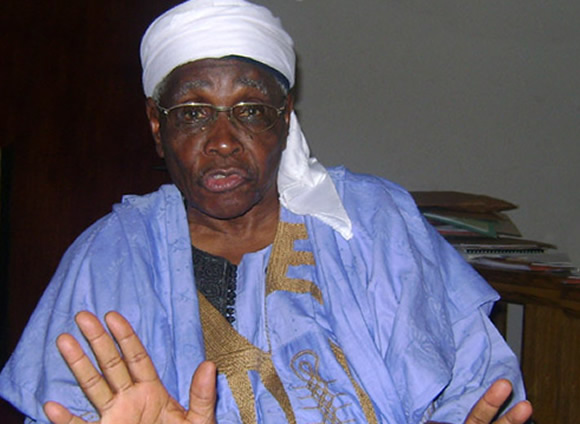National chairman of Northern Nigeria Union (NNU), Professor Ango Abdullahi, has said that it was expected that president Muhammadu Buhari would favour the sections of the country that voted massively for him during the 2015 elections.
Professor Abdullahi stated this while speaking on the activities lined up by the NNU for the 5th commemorative lecture in honour of the late Dr. Olusola Saraki on November 27 this year at the International Conference Centre (ICC), Abuja.
Speaking on the candidacy of President Buhari and the position of the North, Abdullahi said that his endorsement would depend on performance and not sentiment, adding, however, that the president’s electoral fortunes did not depend on the region alone.
“Well,” he said, “do not expect that the fact that Buhari is of northern extraction will automatically translate to satisfying every aspiration or yearning of every nook and cranny of Northern Nigeria.
“In any case, he was not elected exclusively by northerners; he was elected by all Nigerians irrespective of the number of votes he got in different parts of the country.
“The election was one to elect the President of Nigeria and this is what has happened regardless of how we feel in other parts of the country.”
He also spoke on the vexed issue of distribution of government patronage in Buhari’s administration.
“A few days ago, I was arguing about the issue of marginalisation in my interview with Biafra Radio, Germany. People should expect rewards from vote they have cast. Of course, 81 per cent of Buhari’s votes came from the north.
“So, we should expect 81 per cent of all shares of government to come to us, but that’s not being realistic. That’s not what our constitution also says. So, the president, I think, has done extremely well in terms of his outreach to all parts of Nigeria irrespective of the votes he got in the last election.
“We may complain a little bit, some of us in the north. That’s legitimate politics. He himself admitted, I think, today (yesterday) that some party supporters that were expecting rewards for their support have not realised their aspirations.
“He was aware of this, but I think that he has kept to the promise of he is the president of Nigeria. He belongs to all Nigerians. So, we take it that he doesn’t belong to the north or any particular person; he belongs to no one,” he said.
According to Abdullahi, Buhari has demonstrated that he is the president of Nigeria and will serve in the best interest of the whole country, even as he admitted that there are shortcomings which will “someday be made up”.
On the question of national unity, Prof Abdulai said it cannot be a conclusive issue in a country of diverse people as Nigeria.
Flanked by former minister of police affairs, Dr. Ibrahim Lame and former deputy governor of Kogi State, Chief Patrick Adaba among others, Abdullahi recalled that President Buhari had been discouraging calls for the break-up of the country.
He, however, expressed regret that the many political challenges facing the country would continue to test its unity.
He said: “Two days, I spent about two hours of interview with Biafra Radio, Germany, and the issues have been unity, marginalisation, dissatisfaction and so on and so forth,” he said.
“So, based on this current debate, if you want to be honest and sincere, you cannot say that Nigeria’s unity question has been finally settled and no more issues will be raised about it because it is not even human to say so, in the sense that if you really think about the constitution of the country, no constitution anywhere around the world is perfect.
“Issues are being raised about constitutions of countries within themselves. Take, for example, the recent discourse in Britain; there was the issue of referendum to determine whether Scotland wants to remain or not after 350 years.
“You can see what is happening in Spain today. You can look at very many other countries, like India which started with one country and the following year it is India and Pakistan, etc.
“Unity is not a final, settled question in any country, particularly a country of diversity like Nigeria.
“It is utopian to say that unity of the Nigeria is settled because there will always be recurring questions about something (that) is wrong somewhere.
“Whenever you raise the issue of something is wrong, then you are also raising a fundamental issue of, perhaps, this perfect unity people have been hoping for, that needs to be revisited. So, for me, personally, I think that the question of Nigerian unity should continue to be asked, especially now that we have not achieved the perfection our founding fathers want us to achieve.”



Leave a Reply